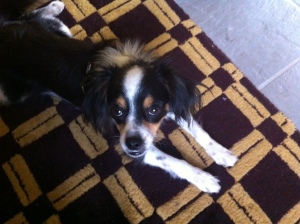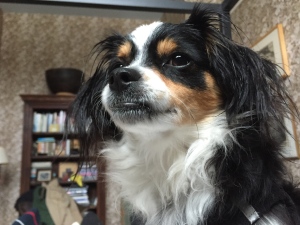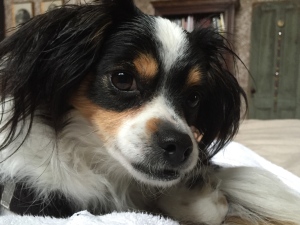His Master’s Voice
 Willie didn’t make a sound for months after we first brought him home; not a whine or a growl or a bark – or even a burp. He seemed happy and healthy and showed us great affection, and we spoke to him all the time – all the usual and expected phrases such as, “Do you want to go outside?” and “Who’s a good boy?” but also “Come on over here and sit here by me” or “This is Charlie, the UPS man!” or “Why do you think Richard put the cheese grater in this cabinet?”
Willie didn’t make a sound for months after we first brought him home; not a whine or a growl or a bark – or even a burp. He seemed happy and healthy and showed us great affection, and we spoke to him all the time – all the usual and expected phrases such as, “Do you want to go outside?” and “Who’s a good boy?” but also “Come on over here and sit here by me” or “This is Charlie, the UPS man!” or “Why do you think Richard put the cheese grater in this cabinet?”
Maintaining eye contact, Willie replied when he was addressed by wagging his tail, by turning around and around in tight circles, by standing and balancing on his hind legs like Bobo the Circus Dog, by touching me with his paw, by rolling onto his back for a belly rub, and with a dozen more non-verbal responses. And though we communicated constantly — a conversation that went on all day, every day — you’d only have been able to hear my half of it, punctuated by empty pauses – like listening to someone speaking on the phone in another room. Willie was so quiet for so long, we actually wondered if he was physiologically incapable of producing sound.
 Eventually, Willie found his voice; a single bark at first, prompted by some unusually aggressive play. Though he’s still pretty quiet most of the time, he’ll whine and bark when he looks out the window and sees a squirrel or a turkey or a chipmunk. And he’ll sound the alarm when someone – say, Charlie the UPS man — comes to the door.
Eventually, Willie found his voice; a single bark at first, prompted by some unusually aggressive play. Though he’s still pretty quiet most of the time, he’ll whine and bark when he looks out the window and sees a squirrel or a turkey or a chipmunk. And he’ll sound the alarm when someone – say, Charlie the UPS man — comes to the door.
Because Richard and I work from home, he and I are engaged in conversation all day long – with each other, and on the phone. Because Willie is usually in close proximity, he’s privy to all this conversation, even though he can’t understand (most of) it. He observes us communicating with speech in that strange way humans do – without sniffing or scent marking, without any rough-housing or humping or baring of teeth. And then one day, after months and months of hearing us talk and laugh and complain and sing, he began speaking to us, too.
Oh, not in so many words, but rather in long strings of sounds. Nearly every morning now, usually after breakfast, Willie will seek out Richard and address him with a remarkable variety of sounds – sounds that vary in pitch and timbre and, strung together, are reminiscent of human speech. “AroooOOO-wahhhhh; HEEEEEE-immmmm nowr.” Pause, wag. “EEEElllraammmayip? Arammayip? Yip? WEEEE-rug, rug, rug. RUG!”
Richard listens and nods and responds, maintaining all the rhythms of an actual conversation.
“Do you think so? Oh, I don’t know Willie; it might be a bit early for that.”
“REEEE-imp! Imph! Frunf!”
“No; I don’t know where it is. Did you ask Ed?”
“Arooo, roo. Waaaaaghhhh-arip.”
 This volley will go on and on, continuing as long as Richard holds up his half of the dialogue, replying and responding to Willie’s “words”. It’s as hilarious as it is amazing, and it seems that by observing and listening for all these months, Willie has literally absorbed the cadences of human speech – something he’s now using, in his own way, to communicate with us. Of course, he still needs Richard to interpret.
This volley will go on and on, continuing as long as Richard holds up his half of the dialogue, replying and responding to Willie’s “words”. It’s as hilarious as it is amazing, and it seems that by observing and listening for all these months, Willie has literally absorbed the cadences of human speech – something he’s now using, in his own way, to communicate with us. Of course, he still needs Richard to interpret.
Chuckling, I look up from my computer. “What did he just say?”
“He says he wants a longer walk this morning – that he wants you to take him to see the geese up at the lake.”
“Okay, then, Willie; let’s go!”
Related Posts
-
 “Gotcha” Day
“Gotcha” Day
Today’s the day Richard and I finally get to meet our new pup and bring him home. 26.02.2014.by edwillmatt@gmail.com -
 GQ Doggie
GQ Doggie
Chad, the fit and burly owner of my gym has not stopped ribbing me about Willie’s size — a 06.03.2014.by edwillmatt@gmail.com -
 The Joy of Socks
The Joy of Socks
“What have you got there, Willie?” Julie and I are in the kitchen at first light; I’m setting the 01.07.2014.by edwillmatt@gmail.com